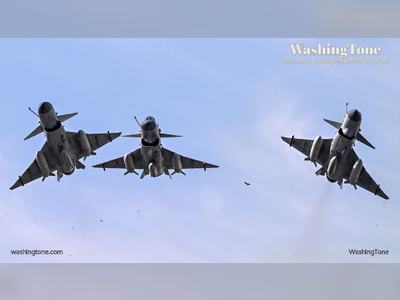White HouseSenateThe HouseSupreme CourtFederal ReserveDOJState DepartmentTreasuryCensusBudget OfficeTrade Representative
WashingTone
Informed by Washington, Defined by Insight
Monday, May 12, 2025
WashingTone

British Aircraft Parts to Be Exempt from US Tariffs in Trade Agreement Progress
US Commerce Secretary announces exemption for British aerospace components amid evolving trade discussions.
British aircraft parts, particularly those manufactured by Rolls-Royce, are expected to be exempt from import tariffs as negotiations progress on a trade deal with the U.S. Trump administration.
U.S. Commerce Secretary Howard Lutnick confirmed that these components would gain access to the U.S. market without tariffs, as part of an economic prosperity agreement announced last week.
While the five-page document detailing the terms of the agreement did not specifically mention these exemptions, UK Business Secretary Jonathan Reynolds assured that the broader aerospace industry would receive a "specific guarantee of zero tariffs." This potential deal is forecasted to benefit a vital sector valued at £40 billion, supporting approximately 450,000 jobs across the UK.
The relevance of this deal extends to the United States as well, where Boeing relies on Rolls-Royce engines for its commercial aircraft.
Additionally, U.S.-based repair and maintenance facilities depend on a consistent supply of parts from UK manufacturers.
Lutnick also revealed that a UK company has plans to purchase Boeing planes worth $10 billion (£7.5 billion), a transaction confirmed by British Airways owner International Airlines Group (IAG).
This anticipated aerospace agreement follows the recently announced U.S.-UK trade deal, which aims to alleviate tariffs on the car and steel industries, addressing concerns over potential job losses.
Speculation suggests that car tariffs may decrease from 27.5% to 10% for at least 100,000 vehicles annually, while steel tariffs could be eliminated.
Peter Mandelson, Britain's ambassador to the U.S., stated that the accord regarding car exports has already averted job losses at Jaguar Land Rover’s facility in the West Midlands.
Both Reynolds and UK Prime Minister Keir Starmer have expressed intentions to increase the quota for British-made vehicles beyond the initial figure of 100,000, as the current arrangement threatens to limit export capabilities.
The prospect of a favorable aerospace agreement arises against the backdrop of a U.S. investigation initiated on May 1 into whether imported aircraft, engines, and parts could pose a national security risk.
This inquiry is focused on the concentration of U.S. imports from a limited number of suppliers and the effect of foreign government subsidies and trade practices that could be seen as predatory.
There have been significant lobbying efforts from the aerospace and aviation sectors aimed at preserving a longstanding treaty that has allowed the duty-free exchange of aircraft and parts since its inception 45 years ago.
The Department for Business and Trade has not commented on the current status of the negotiations.
U.S. Commerce Secretary Howard Lutnick confirmed that these components would gain access to the U.S. market without tariffs, as part of an economic prosperity agreement announced last week.
While the five-page document detailing the terms of the agreement did not specifically mention these exemptions, UK Business Secretary Jonathan Reynolds assured that the broader aerospace industry would receive a "specific guarantee of zero tariffs." This potential deal is forecasted to benefit a vital sector valued at £40 billion, supporting approximately 450,000 jobs across the UK.
The relevance of this deal extends to the United States as well, where Boeing relies on Rolls-Royce engines for its commercial aircraft.
Additionally, U.S.-based repair and maintenance facilities depend on a consistent supply of parts from UK manufacturers.
Lutnick also revealed that a UK company has plans to purchase Boeing planes worth $10 billion (£7.5 billion), a transaction confirmed by British Airways owner International Airlines Group (IAG).
This anticipated aerospace agreement follows the recently announced U.S.-UK trade deal, which aims to alleviate tariffs on the car and steel industries, addressing concerns over potential job losses.
Speculation suggests that car tariffs may decrease from 27.5% to 10% for at least 100,000 vehicles annually, while steel tariffs could be eliminated.
Peter Mandelson, Britain's ambassador to the U.S., stated that the accord regarding car exports has already averted job losses at Jaguar Land Rover’s facility in the West Midlands.
Both Reynolds and UK Prime Minister Keir Starmer have expressed intentions to increase the quota for British-made vehicles beyond the initial figure of 100,000, as the current arrangement threatens to limit export capabilities.
The prospect of a favorable aerospace agreement arises against the backdrop of a U.S. investigation initiated on May 1 into whether imported aircraft, engines, and parts could pose a national security risk.
This inquiry is focused on the concentration of U.S. imports from a limited number of suppliers and the effect of foreign government subsidies and trade practices that could be seen as predatory.
There have been significant lobbying efforts from the aerospace and aviation sectors aimed at preserving a longstanding treaty that has allowed the duty-free exchange of aircraft and parts since its inception 45 years ago.
The Department for Business and Trade has not commented on the current status of the negotiations.










